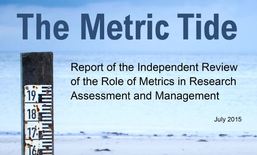 Leiden Manifesto aligns with conclusions of the just released independent review of the role of metrics in research assessment and management, The Metric Tide, commissioned by HEFCE in the UK. The concluding section, entitled Responsible Metrics states: Drawing on discussions over RRI, we propose the notion of responsible metrics as a way of framing appropriate uses of quantitative indicators in the governance, management and assessment of research. The notion of responsible metrics distils the essence of other important contributions to these debates, including the Leiden Manifesto and DORA. Responsible metrics can be understood in terms of a number of dimensions: • Robustness: basing metrics on the best possible data in terms of accuracy and scope; • Humility: recognising that quantitative evaluation should support – but not supplant – qualitative, expert assessment; • Transparency: keeping data collection and analytical processes open and transparent, so that those being evaluated can test and verify the results; • Diversity: accounting for variation by field, and using a range of indicators to reflect and support a plurality of research and researcher career paths across the system; • Reflexivity: recognising and anticipating the systemic and potential effects of indicators, and updating them in response. As stated in the Leiden Manifesto “research metrics can provide crucial information that would be difficult to gather or understand by means of individual expertise. But this quantitative information must not be allowed to morph from an instrument into the goal.” (pp. 134-135) Check out their website at: https://responsiblemetrics.org Comments are closed.
|